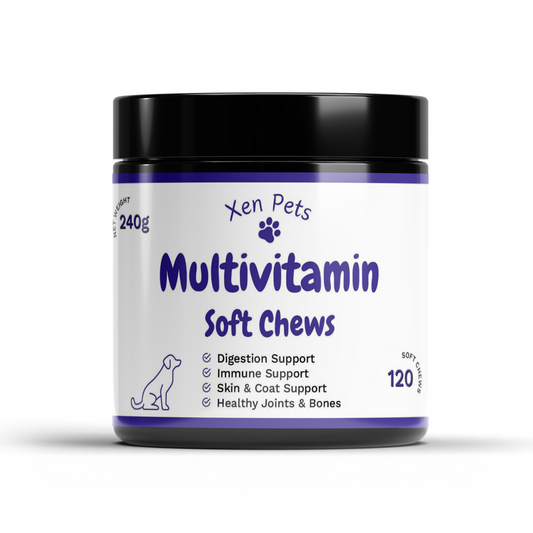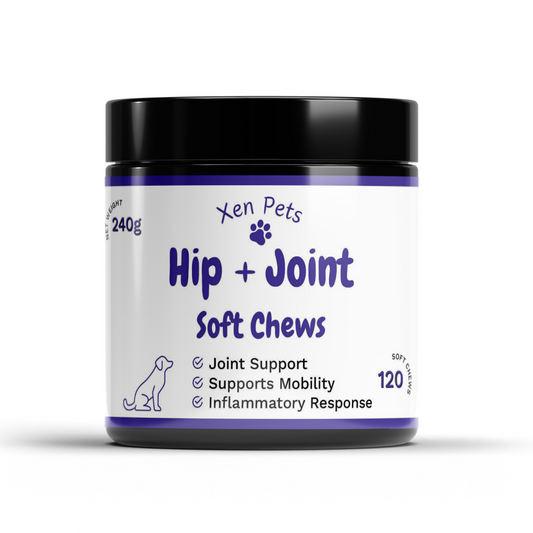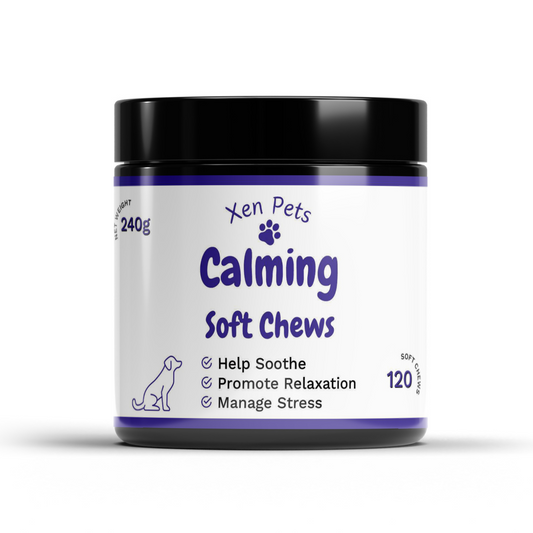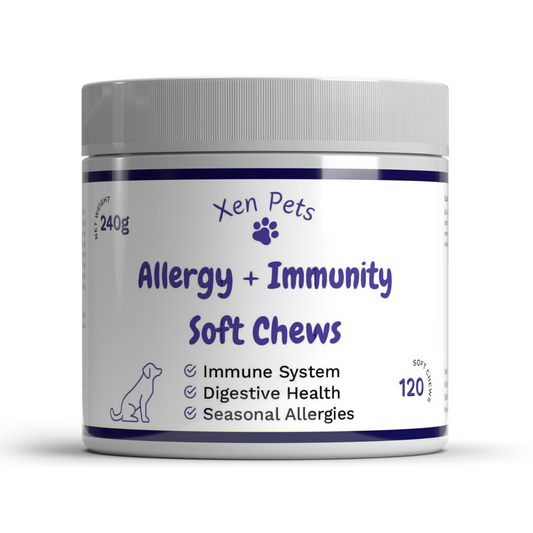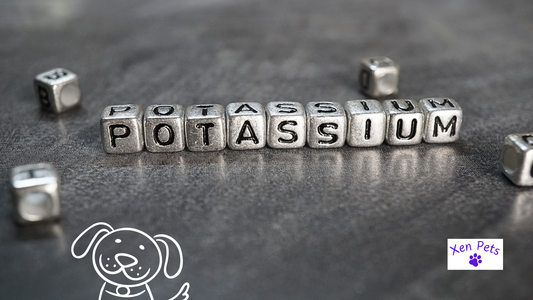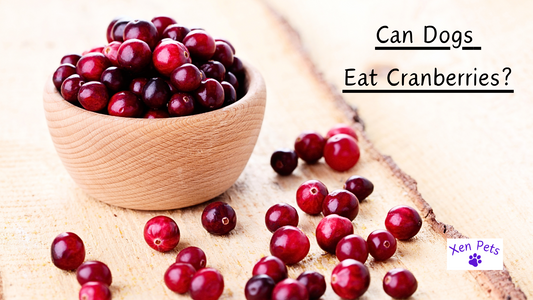German Shepherds are prone to health conditions such as elbow and hip dysplasia. Hip disease can show itself in some dogs from day one. Other dogs may have issues after they age or when their diet isn't properly nutritious for the joints.
Hip dysplasia can be found in about 1 out of every 5 pure bred German Shepherds. Unfortunately, it is a very common occurrence, and it's important to help your German Shepherd find relief and improve their joint health.

German Shepherd hip and joint problems
German Shepherds are notorious for bad joint health, especially senior dogs. Let's take a look at how we can help you improve your dog's joint pain.
One way you could help reduce the pain caused by hip dysplasia would be giving your pup vitamins containing Glucosamine and Chondroitin which work together by reducing inflammation. They also protect cells called chondrocytes. These cells help to maintain cartilage structure.
These supplements may have the potential to slow cartilage damage in their joints, and to help reduce pain in the process.
These two vitamins help reduce inflammation which helps prevent breakdown of cartilage between bones while also slowing its progression so you'll notice less pain during everyday activities.
Causes of joint pain
Joint pain is caused by a number of reasons. Let's look at the most popular reasons your German Shepherd is experiencing joint pain.
Hip dysplasia in German Shepherds
Hip dysplasia is a condition where the hip socket doesn't fully cover one of your ball joints.

This allows it to become partially or completely dislocated, which can cause your dog pain in whatever joint lies opposite this ball. Areas affected by these bones include muscles around that area as well.
Osteoarthritis
Osteoarthritis is a condition that causes the cartilage within your dog's joints to break down and change, leading some people to call it a "degenerative joint disease."
It can occur most frequently in the hips, but there are many types including knee osteophytes.
Osteochondritis dissecans (OCD)
Osteochondritis Dissecans is a condition in which bone underneath cartilage dies due to lack of blood flow.
This can cause pain, and possibly hinder joint motion if it occurs near joints where there are high impact activities such as jumping or running.
Best joint supplement for German Shepherds
There are many joint supplements for German Shepherds. But which are the best supplements? Let's take a look at some key ingredients.
Active ingredients in great joint supplements
- Glucosamine HCL (Shellfish Source)
- MSM
- Ascorbic Acid (Vitamin C)
- Chondroitin Sulfate (Porcine Source)
- D-Alpha Tocopherol (Vitamin E)
Bottom line
German Shepherds are a smart and loyal breed, but they unfortunately come with a few health risks.
Arthritis and hip dysplasia are two common conditions that these dogs face, and both can be extremely debilitating.
While you may not be able to prevent your German Shepherd from developing these conditions, you can take steps to mitigate them. For example, feeding your dog a joint-healthy diet and keeping an eye out for early signs of hip disease will go a long way in ensuring your furry friend stays healthy and happy for years to come.
Frequently Asked Questions (FAQs)
Do German Shepherds need joint supplements?
Yes, giving your German Shepherd joint health supplements is an excellent idea. One (1) out of every five (5) pure blood German Shepherds may develop hip dysplasia and potentially other hip disorders.
What is the best joint supplement for German Shepherds?
Joint supplements with Glucosamine and Chondroitin sulfate promote healthy joints.
Do German Shepherds need hip and joint supplements?
German Shepherds are prone to joint problems, such as hip dysplasia. This condition can cause pain and mobility issues, and may require surgery to correct. Hip and joint supplements can help to prevent these problems, or alleviate the symptoms if your dog is already experiencing them.
The supplements provide essential nutrients that support joints, including omega-3 fatty acids and glucosamine. In addition, they help to reduce inflammation and keep the joints lubricated.
If you have a German Shepherd, talk to your veterinarian about whether hip and joint supplements are right for your dog.
What age do German Shepherds start having health problems?
Health conditions can begin showing symptoms as early as 2 years of age. It's important to be mindful of any changes in your dog's health and speak with a vet as soon as possible.
How can I help my German Shepherd who is in joint pain?
If your German Shepherd is in pain, there are a few things you can do to help ease their discomfort. First, make sure they are getting plenty of exercise. This will help keep their joints flexible and strengthen the muscles around them.
Secondly, give them a balanced diet that includes joint-supporting nutrients like omega-3 fatty acids. You can also give them German Shepherd supplements specifically designed to ease pain.
Lastly, provide them with a comfortable place to rest, like a soft bed or padded crate. By taking these steps, you can help your German Shepherd live a comfortable life despite their pain.
What should I not feed my German Shepherd?
Here are some foods that should be outside of your dog's diet and are considered toxic to German Shepherds.
- Grapes
- Chocolate
- Bones
- Berries
- Avocado
- Corn
- Mushrooms
- Tomatoes
Is fish oil good for German Shepherds?
Yes, German Shepherds are especially prone to joint problems, and the omega-3 fatty acids in fish oil can help to reduce inflammation and pain. In addition, fish oil can also improve skin and coat health, as well as cognitive function.
If you're considering giving your German Shepherd fish oil supplements, be sure to talk to your vet first to determine the appropriate dosage.
Too much fish oil can lead to gastrointestinal upset, so it's important to start with a small amount and increase gradually. With your vet's blessing, adding fish oil to your German Shepherd's diet may help them to feel their best.
Is glucosamine good for German Shepherds?
Yes, one way to help German Shepherds stay healthy and active is to give them glucosamine supplements. Glucosamine is a natural substance that helps to support the health of joints and connective tissue.
It is especially effective in treating arthritis, a common condition in German Shepherds. In addition, glucosamine can help to prevent joint problems from developing in young dogs.
Which food is best for a German Shepherd?
In general, the best dog food for a German Shepherd is one that is high in quality proteins and fats, low in fillers and carbohydrates, and fortified with vitamins and minerals. By feeding your dog a nutritious diet, you can help to ensure a long and healthy life.
There are a variety of commercial dog foods available that are specifically formulated for German Shepherds. These foods typically contain higher levels of protein and fat to accommodate the needs of working dogs.
However, it is important to consult with your veterinarian before switching your dog to a new dog food, as some German Shepherds may be sensitive to certain ingredients.
Do German Shepherds need vitamins?
While German Shepherds are generally healthy dogs, they can benefit from vitamins and supplements. For example, dog supplements such as omega-3 fatty acids can help to keep their coat and skin healthy. Vitamins C and E may also help to protect against some types of cancer.
In addition, German Shepherds are prone to joint issues, so supplements that contain glucosamine and chondroitin may be beneficial.
Before giving your dog any vitamins or supplements, it is important to speak with your veterinarian to ensure that they are safe and appropriate for your pet.
What vitamins can I give my German Shepherd?
Vitamin C, Vitamin E, Omega fatty acids can help to improve the overall health of your German Shepherd, maintain healthy skin, and promote a healthy immune system. Glucosamine and Chondroitin sulfate promote healthy joints.


